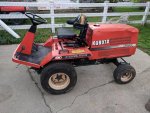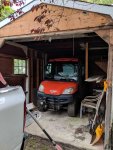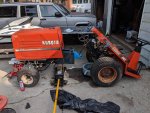Wow - I didn't realize how long it has been since I posted an update on here - sorry about that. I started a new job in June of last year and I am traveling A LOT more than I was at my old position. I don't mind the travel all that much as the places I go to I have never been to before so it is interesting to me. I'm sure after more years of travel going to the same places the novelty will wear off.
The biggest downside of the increased travel is that I haven't been able to really touch any of my projects, including the Kubota. I did hit a major milestone with it today, though. After six years of on and off tinkering with another project (a Mazda pickup) I finally decided to call it quits and sold the truck today to a gentleman with fresh ambition and motivation to take it over. This has opened up a spot in my shop to bring the Kubota in. No more working outside in the elements!
I pulled the RTV in this afternoon and wanted to drain the oil to see how my bottom end rebuild is holding up. I have put about 50 hours on the rebuild and I am still hearing a knock in the engine. It's more noticeable when the engine is cold and idling and it does tend to go away once the engine is warm. It doesn't sound like bearing knock to me and I suspect it's piston slap. When I honed the #3 cylinder to get rid of the scoring marks in the wall, I think I took a little bit too much material out. According to the service manual, the bore I.D. was within tolerance, but it was on the high side. I didn't use an oversized piston or rings and you could visibly see that the #3 piston fit looser than the other two.
While draining the oil I could see what looked to be silver metallic flakes, but they are extremely fine. If I can manage to get a sample of the metal, I'll be able to tell if it's aluminum or iron, which will also tell me where it's coming from. Either way, I don't intend on doing another engine rebuild or replacing the engine any time soon so I'll just run it until it dies. I know piston slap isn't a good thing to have and will eventually do damage in the long term, but the question is how long is long? If I get 1,000 more hours out of this engine, I'll be happy.




 collie
collie